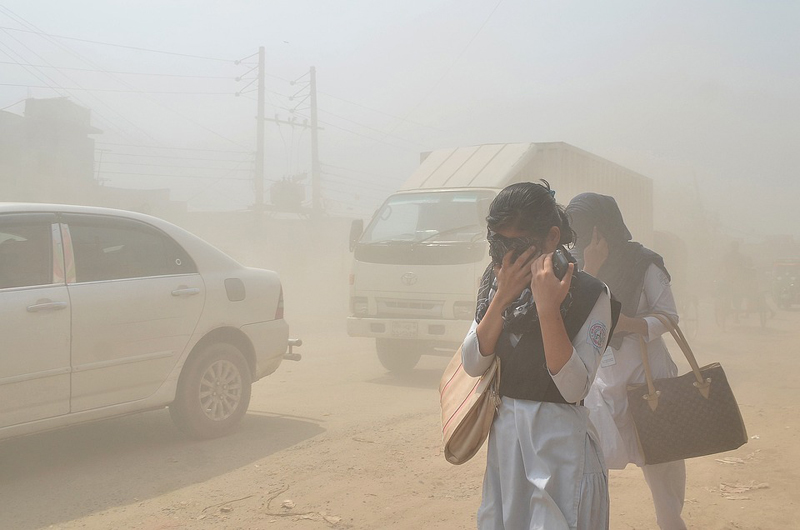 Bangladesh Air Pollution
Bangladesh Air Pollution
High Air Pollution level creating physical, mental health hazards in Bangladesh: World Bank
Dhaka: Exposure to high level of air pollution significantly raises the risks of breathing difficulties, cough, lower respiratory tract infections, as well as depression and other health conditions. Children under five years, elderly, and people with comorbidities such as diabetes, heart or respiratory conditions, are most vulnerable, says a new World Bank report launched Sunday.
The report ‘Breathing Heavy: New Evidence on Air Pollution and Health in Bangladesh assessed the impacts of outdoor air pollution on physical and mental health in Dhaka and Sylhet. To reduce air pollution impacts on health, the report recommended immediate actions, including improving public health services and response mechanisms, improving air pollution data monitoring systems, investing in early warning systems, and engaging in further research.
The report finds that the sites with major construction and persistent traffic in the Dhaka City have the highest level of air pollution. At these sites, the fine particulate matter (PM2.5), which is considered most hazardous to health, is on average 150 percent above the WHO Air Quality Guidelines (AQG), which is equivalent to smoking about 1.7 cigarettes per day. The second highest concentration of PM2.5 levels is found near brick kilns in Greater Dhaka, which is 136 percent above the WHO AQG – equivalent to smoking 1.6 cigarettes per day.
Incidence of lower respiratory tract infections was significantly higher among children living near major construction and traffic sites than elsewhere in the country, including near brick kilns. Sylhet Division, which has the cleanest air in the country, still experiences average PM2.5 concentration levels 80 percent above WHO AQG. This is equivalent to smoking 1.2 cigarettes per day.
“Ambient air pollution puts everyone at risk, from a child to an elderly. In 2019, air pollution was the second largest cause of deaths and disability in Bangladesh and costed about 3.9 to 4.4 percent of the country’s GDP,” said Dandan Chen, Acting World Bank Country Director for Bangladesh and Bhutan “Addressing air pollution is critical for the country’s sustainable and green growth and development. Through analytical work and new investments, the World Bank is helping Bangladesh reduce air pollution.”
Air pollution caused about 78,145–88,229 deaths in Bangladesh in 2019. While air pollution levels within the country vary significantly, the concentration of PM2.5 in all the regions is significantly above the threshold recommended by the WHO Air Quality Guidelines. Dhaka is the most polluted division while Sylhet is the least polluted. From 2018 to 2021, Dhaka was ranked as the second most polluted city in the world. The western regions (Khulna and Rajshahi) are more polluted than the eastern ones (Sylhet and Chattogram). In the Dhaka division, in addition to local pollution sources, up to one-fifth of the total PM2.5 concentration comes from transboundary sources.
A one percent increase in exposure to PM2.5 over WHO’s AQG can result in a 12.8 percent increase in the probability of a person experiencing breathing difficulties, a 12.5 percent increase in the probability of having wet coughs, and an 8.1 percent higher risk of contracting lower respiratory tract infections. Air pollution also affects mental health. Depression is most reported in locations with major construction and persistent traffic. The study finds that a one percent increase in exposure to PM2.5 above the WHO AQG is associated with a 20 percent higher probability of being depressed.
“Air pollution causes the climate to change, and climate change worsens the air quality. Over time, climate change and urbanization will further intensify air pollution,” said Wameq Azfar Raza, World Bank Health Specialist and the lead of the report. “The health sector needs to be well prepared to deal with the imminent health crisis arising from air pollution and climate change.”
Urgent actions will include improving the public health service platform to provide curative care and promoting preventive health care. Community-level screening for persistent coughs and breathing difficulties for people living in air pollution hotspots will help the government address emerging health issues. Close monitoring of air quality data and further research will help devise effective measures to deal with the health impacts of air pollution.
(With UNI inputs)
Support Our Journalism
We cannot do without you.. your contribution supports unbiased journalism
IBNS is not driven by any ism- not wokeism, not racism, not skewed secularism, not hyper right-wing or left liberal ideals, nor by any hardline religious beliefs or hyper nationalism. We want to serve you good old objective news, as they are. We do not judge or preach. We let people decide for themselves. We only try to present factual and well-sourced news.







